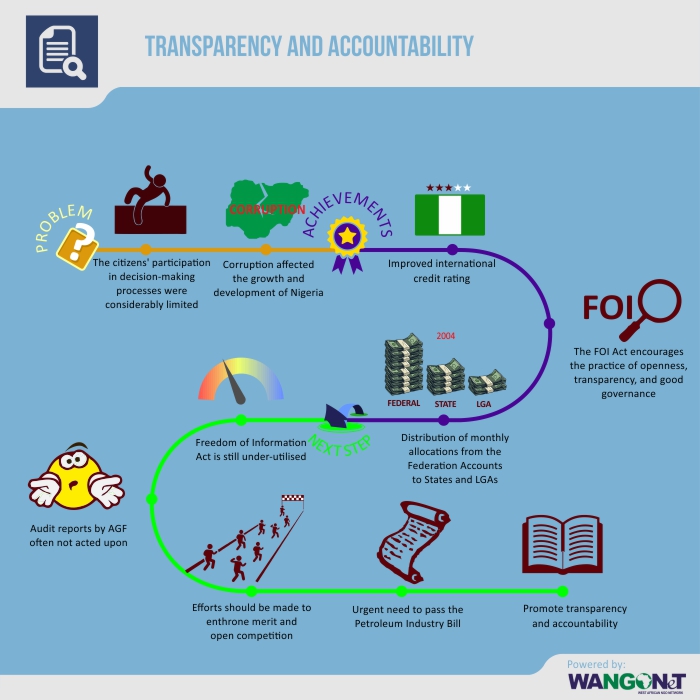Chapter 14
Transparency and Accountability
Background
Nigeria’s military governments ruled by decrees and had little regard for transparency, rule of law and accountability. Thus by 1999, when Nigeria returned to military rule, the country’s public and civil service was characterised by zero transparency, weak accountability, lack of responsiveness, and inefficiency. Citizens had restricted access to only untimely, irrelevant, inaccurate information that was of little use. Citizen participation in national decision-making processes (in policy-making, prioritising issues, accessibility to public goods and services etc.) were limited.
Past Reform and Achievements
Since 1999 efforts have been made to inject transparency, rule of law and accountability into government processes. These efforts included diagnostic studies to identify specific areas where corruption arising from the lack of accountability, transparency, was having high negative impacts on the treasury in Nigeria; and then anti-corruption measures in a comprehensive reform programme.
Watershed in the efforts was the establishment of the Nigeria Extractive Industries Transparency Initiative (NEITI) in May 2007, to follow due process towards achieving transparency in the payments made by the extractive industry to governments and government-linked entities. The Federal Ministry of Finance set up a fund for safeguarding windfall revenues resulting from high petroleum price, and began a regular publication of the details of funds from oil sales that are allocated to the federal, states and local governments. To improve public expenditure management, it began the ministry also began publishing monthly allocations from the Federation Accounts to the three tiers of government in newspapers and on its website.
Furthermore on 28 May 2011 The Freedom of Information (FOI) Act was enacted to guarantee citizens the right of access to information held by public institutions, irrespective of the form in which it is kept. The Act was also made applicable to private institutions whenever they handle public funds, perform public functions, or provide public services.
Challenges and Next Steps
Accurate record keeping should be mandated in all government offices. Audit reports should become periodical and their recommendations always acted upon. State and local governments should make efforts towards transparency and accountability, which are almost completely absent in their operations.


